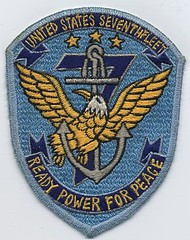New Plan for Better Vets' Care
New Plan for Better Vets' Care
Associated Press | April 25, 2007
WASHINGTON - Injured Soldiers and veterans grappling with backlogs and red tape will now fill out less paperwork, get more screenings for brain injury and have an improved claims system, a presidential task force said Tuesday.
Responding to criticism about poor treatment of injured Soldiers, the interagency task force headed by Veterans Affairs Secretary Jim Nicholson released its report and recommendations for immediately improving veterans' care.
The panel acknowledged that government procedures are unwieldy, with unacceptable gaps as service members and veterans move from military hospitals to the VA's vast network of 1,400 hospitals and clinics.
"The federal government must be responsive and efficient in delivering our benefits and services to these heroes," Nicholson said in announcing recommendations to improve care for troops and veterans returning from Iraq and Afghanistan. "They should not have to fight bureaucratic red tape for benefits earned by their courageous service.
"We are not perfect," he said. "We recognize that this huge bureaucracy needs a major transformation."
Pointing to poor coordination between the VA and Pentagon, the recommendations call for a joint electronic case management system that would allow officials to share files and to track patients much as shipping companies track packages.
Case managers will be added to help guide troops and their families through the process, and all veterans receiving care in VA facilities will be tested for mild to moderate brain injury, an often unseen problem that can emerge months after finishing service.
Blaming backlogs on "improved outreach," Nicholson said he also has requested money to hire more staff to help reduce the time spent processing benefit claims - now an average of 177 days - to 125 days.
The task force, which includes Cabinet secretaries and officials at eight government agencies, also urged the creation of a joint disability claims process to be handled by the Pentagon and VA to speed delivery of benefits and reduce disparities in the system.
President Bush said he welcomed the recommendations and instructed government agencies involved to report on their progress within 45 days. "The brave men and women who have volunteered to protect and defend our country deserve to receive the highest level of support from our grateful nation," Bush said in a statement.
Critics say the Army consistently rates Soldiers' injuries as less severe than do their counterparts in the other armed services and the VA. One congressional commission has suggested the Army might do so to avoid paying higher disability benefits.
Lawmakers on Tuesday welcomed the report but noted that many of the recommendations - such as improving cooperation among agencies - weren't particularly new.
"Pronouncements that imply that reports equate to progress are premature," said Rep. Steve Buyer, R-Ind., the top Republican on the House Veterans Affairs Committee. "When we see federal agencies - principally the Pentagon and VA - working hand in glove for the benefit of veterans, then we can talk about real progress."
Some Democrats were more critical.
"While I am glad that Secretary Nicholson is finally talking about a plan for moving forward to help our veterans, neither his findings, nor his recommendation are news to Congress," said Sen. Patty Murray, D-Wash., a member of the Senate Veterans Affairs Committee. "As we enter the fifth year of this war, it is crystal clear that the administration has never adequately planned for wounded warriors coming home."
Among the report's recommendations:
-Expedite housing claims and other services for returning service members from Iraq and Afghanistan, some of whom become homeless.
-Expand eligibility of small business loans to provide more opportunities for veterans to become self-employed. The Labor Department will also work with veterans as they recover from injuries to ease their transition to civilian life.
-Improve outreach with additional newsletters and job fairs for veterans.
Nicholson presented the recommendations to Bush on Monday. The task force, charged with devising immediate solutions that would not require additional funding or new legislation, said it will continue to monitor agencies and will meet again in 45 days to report on the progress.
The task force is one of several commissions and congressional committees investigating ways to improve veterans' care following disclosures in February of shoddy treatment at Walter Reed Army Medical Center.
A separate presidential commission, chaired by former Sen. Bob Dole, R-Kan., and former Health and Human Services Secretary Donna Shalala, is expected to release its recommendations by late July.



































